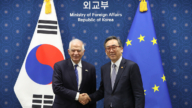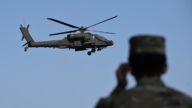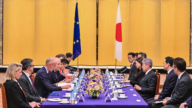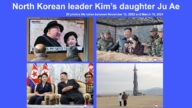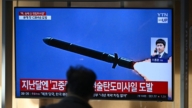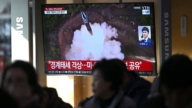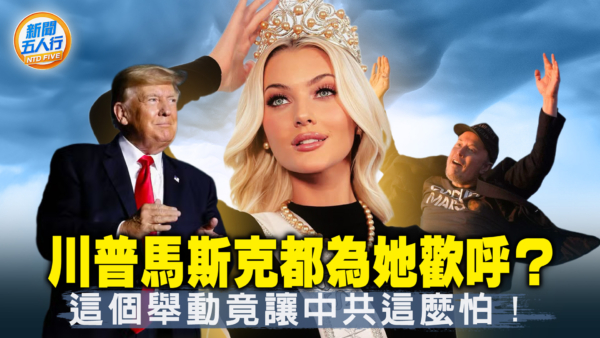【新唐人2014年07月01日讯】中共领导人习近平将于7月3号和4号出访韩国,成为上任后第一位还没访问朝鲜,就先访问韩国的中共领导人。分析人士指出,习近平此举凸显了对朝鲜领导人金正恩的不满,也希望借此拉近与韩国的关系,削弱美国在亚太地区的影响力。
6月27号,中共外交部在例行记者会上宣布,习近平将于7月3号至4号对韩国进行国事访问。近20年来,中共领导人一向先访问朝鲜,再访问韩国,这一次,以国家主席身份访问韩国的习近平,将打破这一惯例。
韩国青瓦台27号也发布声明说,习近平和韩国总统朴槿惠(Park Geun-hye)将就包括朝鲜核问题在内的朝鲜半岛问题,商讨合作的方式。
中国是朝鲜主要的援助国、及外资来源和贸易伙伴。美国《华尔街日报》引述分析人士的话指出,北京不满朝鲜领导人金正恩没有对北京展现“应有的尊重”。而习近平此行,让金正恩知道,谁才是中、朝关系的主导者。
旅美政论家伍凡:“金正恩上台3年了,中国的领导人没有访问平壤,现在习近平正式要访问韩国,这就是说明,中国和朝鲜的关系非常坏、非常僵。金正恩不愿意跟中国友好,他一而再、再而三在中国门口要搞核试验,中国劝他,他不听,并且叫嚣要打美国、打日本、打韩国,总的来讲,他是战争的一个祸源。这一次习近平先去访问韩国,就是给小金胖子一个颜色看。”
6月29号凌晨,朝鲜在江原道元山一带,向朝鲜半岛东部海域发射了两枚短程导弹,射程500公里,疑为飞毛腿系列。
韩国军方认为,朝鲜在习近平访韩前夕发射导弹,可能是一种“武力示威”,朝鲜也试图以此吸引有关各方的关注。
北京时政观察人士华颇:“朝鲜这次发射导弹,表面层次就是告诉中国,我并不听你的,我会按照我的利益行事,也对中国一直也没允许金正恩访问北京的一种愤怒的宣泄。深层次的来说,朝鲜发射导弹,其实是向美、日,尤其是美国喊话,要知道朝鲜的经济已经到了崩溃的边缘,他需要大量的外援,所以他就想和美、日搞好关系,尤其是和美国搞好关系。”
最近,日本首相安倍晋三向供奉了二次大战甲级战犯的“靖国神社”献上祭品,而他对慰安妇的态度同样惹怒了韩国。北京时政观察人士华颇指出,北京急于利用韩国和日本的紧张关系,来削弱美国在亚太地区的影响力。
华颇:“美国重返亚太,他要加强美、日、韩、澳大利亚,还有东盟的战略同盟关系,但是中国看到了,韩国和日本存在着历史和领土争端,所以中国从韩国寻找突破口,拉近和韩国的距离,让韩国不要加入美国在亚太地区的防导网(防御导弹网)。”
报导说,自从朝鲜上次进行核试验以来,中国学者和官方媒体开始更为公开的批评朝鲜。但是,外交人士和相关专家向《华尔街日报》指出,中共对朝鲜的政策并没有根本性变化,中共军方仍视朝鲜为对抗驻亚洲美军的重要战略缓冲带。
另一方面,报导说,韩国总统朴槿惠曾在去年6月访问北京,她将改善与中共的关系,作为韩国的外交工作重点。不过,韩国官员在渴望与北京加强联系的同时,也担心中共在亚洲的行事会更加强硬。去年11月,中共设立防空识别区,但这一防空识别区与韩国此前设立的防空识别区有重叠。而且近年来,韩国与中国的渔业纠纷不断。据《韩联社》报导,截至5月12号,今年因非法捕捞而被扣留的中国渔船共有80艘,罚款总额达12亿韩元。
韩国峨山政策研究学会(Asan Institute for Policy Studies)会长咸在凤(Hahm Chaibong),他向《华尔街日报》表示,韩国仍在探索与中共的关系。
采访/朱智善 编辑/陈洁 后制/陈建铭
Xi Visits South Korea to Show Beijing’s Discontent for North
The Chinese leader Xi Jinping will visit South Korea on July 3
and 4.
Xi is the first CCP leader to visit South Korea
before going to North Korea.
Commentators say his decision shows Beijing’s displeasure
with North Korean leader Kim Jong-un and Beijing’s decision
to build closer relations with South Korea in order to weaken
U.S. influence in the Asia-Pacific region.
On June 27, the CCP Foreign Ministry announced in a
press conference that president Xi Jinping will conduct
a state visit to South Korea on July 3 and 4.
For the past 20 years, the CCP leaders have always visited
North Korea before South Korea.
Xi Jinping is breaking this convention.
The South Korean Blue House, the presidential office,
said in a statement Friday that Mr. Xi and Ms. Park will
“exchange opinions on cooperative ways
to deal with situations on the Korean peninsula
including the North Korean nuclear issue."
China is North Korea’s main ally,
aid provider, investor and trade partner.
Wall Street Journal quoted analysts saying, “Beijing’s frustration
at North Korean leader Kim Jong Un’s perceived unwillingness
to show due deference to China,” and “Beijing feels that it needs
to teach him a lesson and show who is the alpha male
in the relationship”.
Political commentator Wu Fan: “Kim Jong Un has taken office
for three years, but the CCP leader has not visited Pyongyang.
This visit to South Korea first shows that relations
between China and North Korea are in the rough.
Kim Jong-un is reluctant to be friendly with China,
and has even conducted nuclear tests near the Chinese border.
Rather than taking advice, Kim has threatened to fight
the US, Japan, the South Korea.
I think he is a curse of war.
Xi Jinping’s visit to South Korea first is a slap in Kim’s face."
On the morning of June 29, North Korea fired two short-range
ballistic missiles into seas east off its coast on Sunday.
The missiles, which flew about 500 km (310 miles),
appeared to be Scud class.
South Korean military officials say that North Korea launch
of the missiles prior to Xi Jinping’s visit to South Korea is
provocative and attention grabbing.
Hua Po, Beijing politics watcher: “Superficially, North Korea’s
missile tests tells Beijing that North Korea will not be submit
to China, and will act based on its own interests, and it shows
North Korea’s anger at the delay of a state visit
of North Korea to China.
At the deeper level, the test tells the U.S. and Japan its intention
to keep a good relation with them.
North Korea is at the brink of economic collapse,
and is in need of a lot of foreign aid."
Wall Street Journal reports that visits by Japan’s president
to shrines for war criminals, and his statements on Korean
“comfort women” have angered South Korea.
These “comfort women” were “forced to work in brothels
during Japan’s occupation of the Korean peninsula and its
expansion into China before and during World War II.”
Hua Po says Beijing is anxious to down play U.S. influence
in the Asia-Pacific region by exploiting tensions
between South Korea and Japan.
Hua Po: “The United States will return to Asia
by strengthening a strategic alliance with Japan, Korea,
Australia and ASEAN.
Beijing wants to exploit the historical and territorial disputes
between Japan and Korea so as to get closer
to South Korea and prevent South Korea from joining
the U.S. defense network in the Asia Pacific region."
WSJ reported that “Chinese academics and state media
have become more openly critical of North Korea
since its last nuclear test.
“Diplomats and experts who track the issue closely said there
has been no fundamental change in China’s policy toward North
Korea, which the Chinese military still sees as an essential
strategic buffer against U.S. forces in Asia.”
South Korean President Park Geun-hye is making relations
with China a top priority and paid a visit to Beijing last June.
WSJ says “She also made bilateral free-trade negotiations with Beijing
a priority.
“While officials in Seoul stress strong ties with Beijing, they
are also wary of China’s more assertive behavior in the region.
“Seoul protested last year over Beijing’s establishment of an
air-defense zone that overlapped with South Korea’s
pre-existing zone.
“Friction has also been generated by deadly clashes
between Chinese fishermen and the Korean coast guard
in waters close to the Korean coast.”
Seoul-based Yonhap reports that as of May 12 this year,
80 Chinese fishing boats have been detained for illegal fishing
and fined a total of $1.2 million.
President Hahm Chaibong of the Seoul-based think tank
Asan Institute for Policy Studies told WSJ that South Korea
is “still figuring out the relationship with China."
Edit/Zhuzisan Interview/Chenjie Post-Production/Chenjianmin





